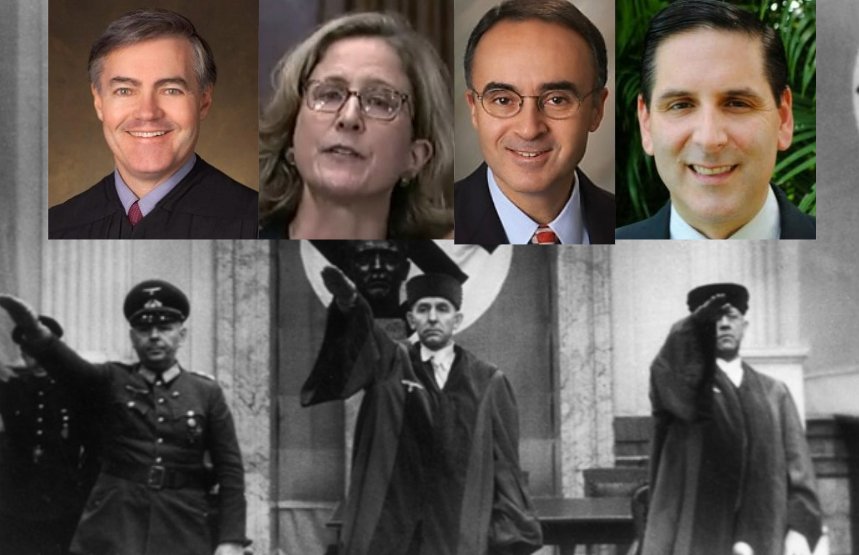APARTHEID APPROVED IN MAINE BY BIDEN FEDERAL APPEALS COURT JUDGES
FEDERAL APPEALS COURT BREAKS OWN RULES TO DENY OCCUPATIONAL LICENSE TO FORMER FELON, COMMITTED CRIME 34 YEARS AGO
Federal Judges John A. Woodcock, Lara E. Montecalvo, William J. Kayatta and Gustavo Gelpi approved Apartheid in Maine. Photo composite credit: JB Nicholas with Wikipedia.
THE FREE LANCE NEEDS YOUR DONATIONS TO SURVIVE. DONATE HERE.
A federal appeals court has rejected a civil rights lawsuit that challenged an Apartheid-like, two-track occupational licensing regime in Maine.
"Bold," the First Circuit Court of Appeals’ decision says, "but untenable."
The decision, Nicholas v. Camuso, No. 23-1435, upheld Maine's decision to deny The Free Lance's publisher, JB Nicholas, an outdoor guide license based on his 34-year-old felony conviction. The decision first issued Feb. 20, but Nicholas asked the court to reconsider. It denied that request on Thursday.
The loss in Massachusetts is a stunning defeat. Nicholas won a similar suit against New York. He was issued an outdoor guide license by state officials there in Nov. 2023.
Nicholas accused the First Circuit of breaking its own rules to dismiss his lawsuit in a statement on X, the social media website formerly known as Twitter.
“They literally bent the law to match the result they wanted, ignoring the specific text of Constitutional amendments and federal law to do it,” his statement said. “That's what they do sometimes when you got them beat, they change the rules in the middle of the game.”
“From my perspective,” the veteran guerilla civil rights litigator added, “that counts as a victory too. I reduced them to cheaters. Cheaters!”
The appeals court’s decision leaves Maine one of only two remaining states with laws that allow it to deny guide licenses to former felons for the rest of their lives. The other is New Hampshire. A suit against the guide licensing regime there, also filed by Nicholas, is pending.
Maine's system makes it practically impossible for former felons to obtain the occupational license the state requires to be an outdoor guide. Most don’t even apply. The system is particularly onerous because it applies not just to felons on parole, but to ones who have totally completed their sentences.
The lawsuits are Nicholas's constitutional attack on the New Jim Crow.
The New Jim Crow is the court-sanctioned stripping of the civil rights of former felons has resulted in 77 million Americans being deprived of their constitutional right to work in occupations of their choice. The wholesale, widespread restrictions are tantamount to socio-economic slavery. They've fueling the growth of a swelling underclass.
Nicholas was convicted in New York of manslaughter in 1991 for shooting an armed robber to death when he was 19 because the 26-year-old man was about to rob him and three companions. Released in 2003, he graduated from New York University and went to work as a journalist in 2006.
In 2023, 20 years after his parole, Nicholas applied for the occupational license Maine requires to work as an outdoor guide. Maine denied him the license solely because of his then 33-year-old felony. He sued under a 153-year-old federal law that allows citizens to hold state officials accountable for violating their constitutional rights in federal court, 42 U.S.C. Section 1983.
He argued that working as a guide was protected by the First Amendment right to speech and association as well as his Fourteenth Amendment due process right to occupational liberty. Because he had completely served his sentence, and was no longer even on parole, there was no evidence he was presently dangerous. Without that evidence, there was no legitimate legal reason to deny him the license. Doing so was irrational and unconstitutional.
Despite federal court rules requiring restrictions on constitutional rights—like Maine’s Apartheid-like licensing regime—be supported by some evidence, both the federal district court in Maine and the Boston-based appeals court refused to require Maine to submit that proof.
Instead, the judges simply rubber-stamped Maine’s denial of Nicholas’s application for a guide license because the New Jim Crow is the law of the land. Everybody does it everywhere.
"Fingerprinting and criminal background checks for workers with responsibilities touching upon public safety are common," the court reasoned. "Maine's version here is not so odious as to be facially unconstitutional as drafted."
Federal Judge John A. Woodcock dismissed Nicholas’s lawsuit May 12, 2023. William J. Kayatta, Gustavo Gelpi and Lara E. Montecalvo made up the three-judge panel that rejected Nicholas’s appeal. Woodcock was nominated by George W. Bush in 2003. Kayatta was nominated by former Pres. Barack Obama; Gelpi and Montecalvo were nominated by Pres. Joe Biden.
The judges required the decision not be published. Because the First Circuit’s website does not offer access to a database of its unpublished decisions, the decision is, for all practical purposes, shrouded in secrecy. Out of America’s 12 federal courts of appeal, only three deny the public access to unpublished decisions.
Not only does the First Circuit’s decision contradict a decision by a federal court in New York, it appears to contradict the Mar. 4 U.S. Supreme Court decision in Trump v. Anderson. That decision allows former president Donald Trump to run for president in the 2024 presidential election—notwithstanding allegations he committed criminal insurrection and other crimes in 2020.
If an accused insurrectionist can run for President, as the Supreme Court held, a former felon should be allowed to test for an occupational license, Nicholas argues.
His next step is asking the Supreme Court for the special permission required to appeal to it, which the court rarely grants. Read the brief here.
THE FREE LANCE NEEDS YOUR DONATIONS TO SURVIVE. DONATE HERE.
